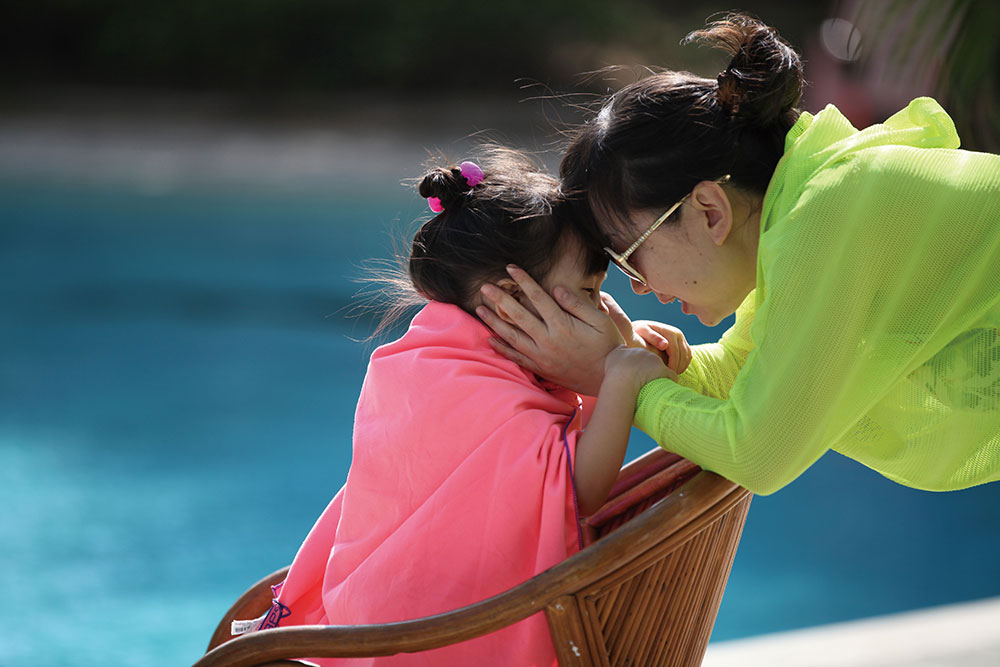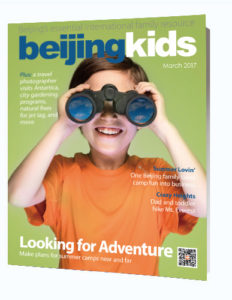In this month’s West Meets East, we ask parents from different cultural backgrounds about traveling with kids.
Mey Jansen describes herself as Indonesian Australian. She used to work as an architect but now she’s a stay at home mom, volunteering her time on the committee of different organizations. Husband Kamal (Indonesian) is an engineer, and they have two daughters: Jasmine (18) studies at the University of Melbourne, while Jazzlyn (15) attends the Western Academy of Beijing (WAB).

They’re a truly international family, having lived in Indonesia, Australia, the US, and Kazakhstan before moving to Beijing (for the second time) in January 2016.
How often do you travel with your daughter?
On average, two to three times each year.
Does your child have a say in what sort of vacations you take?
Yes, we will usually discuss our destination and travel plan together, and talk about travel companions.
What tricks or tips do you have for surviving long journeys?
I will bring wet tissue, dry tissue, antisepsis paper and some clean plastic bags in my backpack just in case. They are very useful, especially when the kid is at a young age. Further it’s very important and essential to buy travel medical insurance which covers both accident and outpatient service, if traveling outside mainland China. A few hundred yuan might save you a huge amount of medical cost.
How do you cope with check in and security at airports?
On our very first few trips, we told our daughter what check-in and the security check are, and what the procedures are step by step, and pre-alerted her to the possibility that we might be waiting a long time. When my daughter was little, it was very normal that she became impatient. The best pacifying method was Mom’s hugging and calm mood! Now she’s grown up a bit, it rarely happens that her mood gets very fretful. But if the waiting time is too long, she might get bored. Then a lollipop could be a good choice to pacify her.
How do you help your daughter deal with culture shock?
My daughter is only five years old, so she doesn’t have a strong feeling of culture shock. But when traveling out of China, we will definitely encounter numerous differences, like language, rules, habits, among others. The best way is to communicate with her before traveling, and when she is confused, just to explain. I think the most effective and simplest way to get along with a kid is to treat her as an independent person with respect, communication and equality, and to accept her uniqueness in being young. This principle applies to all possible difficulties and confusions, during travel, and during daily life.
How do you help your daughter deal with jet lag?
The worst jet lag happened when we traveled to the US. My daughter was three years old. She woke up at midnight for the first two or three days. We played quiet games in bed for about an hour, then turned off the light and went to sleep. It took about three to four days for her to adjust completely. In fact, I think it’s easier for kids to get over jet lag than adults, as the adaptability of a child’s biological clock is very high.
Do your children get travel sickness? If so, what do you do?
No. But she feels pain inside her ear when the plane lands. I hug her and give her a lollipop.
What sort of accommodation do you book?
I choose hotels with high standard of comfort. Sometimes I also choose hostels with good ratings and comments, depending on our destination.
Are there any trips you wouldn’t take your children on?
I wouldn’t take her to any places where there are security risks, or places where there are hygiene issues.
How much do you pack when traveling with kids?
My daughter brings a small suitcase with wheels with her favorite toys, and things which might be needed on plane including a drawing book and pencils. I myself will bring a trolley case with stuff for my daughter and I will also bring a backpack. If my husband has time to travel together with us, he will bring another trolley case.
Beijing mom Jessica lives with her husband and their five-year-old daughter Niu Zi (濾綾).

Jessica owns a ship equipment agency, and in her spare time enjoys travel, reading and food.
How often do you travel with your children?
About three to four times a year for trips internationally. For trips within China it really ranges depending on everyone’s schedule, and can sometimes just be day trips. It’s hard to coordinate when the kids are in high school and university due to their commitment to extracurricular activities at school, and they may prefer to relax at home rather than travel for only a day or two.
Do your kids have a say in what sort of vacations you take?
Yes, they do. They often suggest places depending on whether they would prefer to go to areas with beaches, cultural activities, sports or areas for hiking, walking, swimming, or snorkeling, or a destination just to relax and take in the sights. While everyone in the family is welcome to suggest the type of vacation they would like or where they want to go, the final decision is made through a family discussion.
What tricks or tips do you have for surviving long journeys?
We all pack our hand carry bags with books, movies on our laptops, and ensure there’s music or podcasts that we want to listen to on our phones. It’s also important to get a good amount of sleep before the traveling day, and to try and get sleep during the journey (if it’s a long plane flight for example).
How do you cope with check in and security at airports?
We arrive at the airport around three hours before our flight time – this can be earlier if it is an international flight, or a bit later if it is a domestic flight. If possible, we do online check-in the day or night before our flight, so that at the airport we only need to drop our baggage. We try to weigh all the baggage at home prior to arriving at the airport so that there are no surprises with excess baggage on the day. We also ensure that we know where certain items in our carry-on bags are, such as laptops and battery packs which need to be taken out during security checks. If we have any liquids in our carry-on, we try to put it in a ziplock bag before arriving at the airport, or throw out/ empty any water bottles we have. All of the above things we do help make for a more smooth, quick and efficient check-in and security check.
How do you help your children deal with culture shock?
We try to read or look up different aspects surrounding the holiday destination prior to arriving there. This means we are more prepared in terms of what activities we want to do, what places we want to go to and what food we want to try for example, but also means there is less of a culture shock when arriving since we know what to expect. This also means that if a country has a culture or religion that has traditions or ways of living that are different to ours, we are more prepared to adapt and accommodate this. If there’s something we see when we arrive in the country that shocks or confuses us or we don’t understand the reasoning behind what has happened, someone in the family will usually note it down and look it up later that night so we understand and know what to expect if we encounter it again.
How do you help your children deal with jet lag?
We usually try and wake up at a relatively normal time in the morning at the holiday destination (in the time zone of the destination), and may get the kids to sleep earlier at night so that they get enough rest but can wake up around a normal time the next day.
Do your children get travel sickness? If so, what do you do?
No, we are very fortunate that neither of our children get travel sick. However, in case of motion sickness on boat rides (especially if going to a beach or island location which results in some rocky boat rides), I may put some motion sickness tablets in my bag.
What sort of accommodation do you book?
We use hotels, rent apartments and also use AirBnb (with pool, and if possible with a kitchen).
Are there any trips you wouldn’t take your children on?
While we would like to keep every destination a possibility for travels, we usually keep track of what locations are dangerous or high-risk to go to (as recommended by the Australian government) and stay away from them.
How much do you pack when traveling with kids?
We usually have approximately 20kg (depending on the airline, etc) of baggage allowance per person, making the family baggage total about 80kg (since there are four of us). However, we don’t usually use all of this baggage allowance in order to keep things relatively light and easy to transport around. It usually depends on whether we are going to a summer or winter location, how long we will be there for, and what things we are planning to do.

This article originally appeared on p. 44-45 of beijingkids March Issue. Download a copy here.




